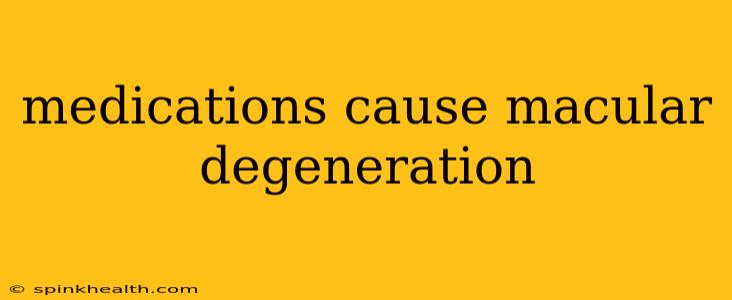Macular degeneration, a progressive eye disease affecting the central part of the retina (the macula), can significantly impair vision. While age is the primary risk factor, certain medications have been linked to an increased risk or accelerated progression of the disease. This isn't to say these medications cause macular degeneration directly, but rather they may contribute to its development or worsen existing conditions. Understanding this connection is crucial for proactive eye health.
My journey into researching this topic started with a personal experience. My grandmother, a vibrant woman with a zest for life, experienced a rapid decline in her vision. While age was a factor, we later discovered that some of her medications might have played a role. This sparked my interest in exploring the complex relationship between medications and macular degeneration. Through extensive research, I've compiled this guide to inform and empower you with knowledge.
What Medications Are Linked to Macular Degeneration?
Several medications have been associated with an increased risk of macular degeneration, or at least, complications that might accelerate the condition's progression. It's vital to remember that this association doesn't imply direct causation; individual responses vary greatly. Always consult your ophthalmologist and physician before making any changes to your medication regimen.
This is not an exhaustive list, and further research is ongoing:
- Certain cardiovascular medications: Some studies suggest a possible link between certain antihypertensive medications (used to lower blood pressure) and an increased risk of macular degeneration. This includes some diuretics (water pills) and beta-blockers. The exact mechanism isn't fully understood, but it might involve changes in blood flow to the retina.
- Some antimalarial drugs: Chloroquine and hydroxychloroquine, used to treat malaria and other autoimmune diseases, have been linked to a rare but serious form of macular degeneration called chloroquine retinopathy. Regular eye exams are crucial for individuals taking these drugs.
- High-dose antibiotics: While not directly causing macular degeneration, prolonged use of high-dose antibiotics has been associated with certain side effects that might indirectly affect eye health.
- Chemotherapy drugs: Some chemotherapy agents have shown potential links to eye-related side effects, although the association with macular degeneration specifically requires more research.
Can Certain Medications Exacerbate Existing Macular Degeneration?
This is a crucial point. While some medications might contribute to the development of macular degeneration, others can exacerbate pre-existing conditions. This is often tied to the medication's side effects, such as:
- Increased blood pressure or cholesterol: High blood pressure and cholesterol can negatively impact blood flow to the retina, potentially worsening macular degeneration.
- Impaired kidney function: Kidney problems can affect the body's ability to filter out waste products, which may indirectly influence eye health.
How Often Should I Have Eye Exams If I'm Taking These Medications?
Regular eye exams are paramount, regardless of whether you're on medication. However, if you're taking any of the medications mentioned above, more frequent check-ups are crucial. Your ophthalmologist can monitor for any early signs of macular degeneration or retinopathy and adjust your treatment plan accordingly. The frequency of these exams will depend on your individual risk factors and your doctor's recommendations.
What Can I Do to Protect My Eyes From Macular Degeneration?
Beyond medication considerations, adopting a healthy lifestyle plays a significant role in protecting your eyesight:
- Diet: A diet rich in antioxidants (found in leafy greens, berries, and colorful fruits and vegetables) may help protect against oxidative stress, a factor implicated in macular degeneration.
- Lifestyle: Avoid smoking, maintain a healthy weight, and manage existing health conditions like high blood pressure and diabetes.
- Sun protection: Wear sunglasses that block UV rays to protect your eyes from sun damage.
Are There Any Medications That Can Help Prevent or Treat Macular Degeneration?
Currently, there isn't a cure for macular degeneration, but several treatments can slow its progression or manage its symptoms. These include:
- Anti-VEGF injections: These injections target a protein that contributes to abnormal blood vessel growth in the eye.
- Nutritional supplements: Certain supplements, such as AREDS2 formula, may help slow the progression of the disease in some individuals.
Always consult your ophthalmologist or a healthcare professional to determine the best course of action for your specific situation.
This information is for educational purposes only and does not constitute medical advice. Always consult with your healthcare provider before making any decisions related to your health or treatment. Your individual risk factors and medical history should guide your choices, and your doctor is best equipped to assess these elements and provide personalized guidance.

